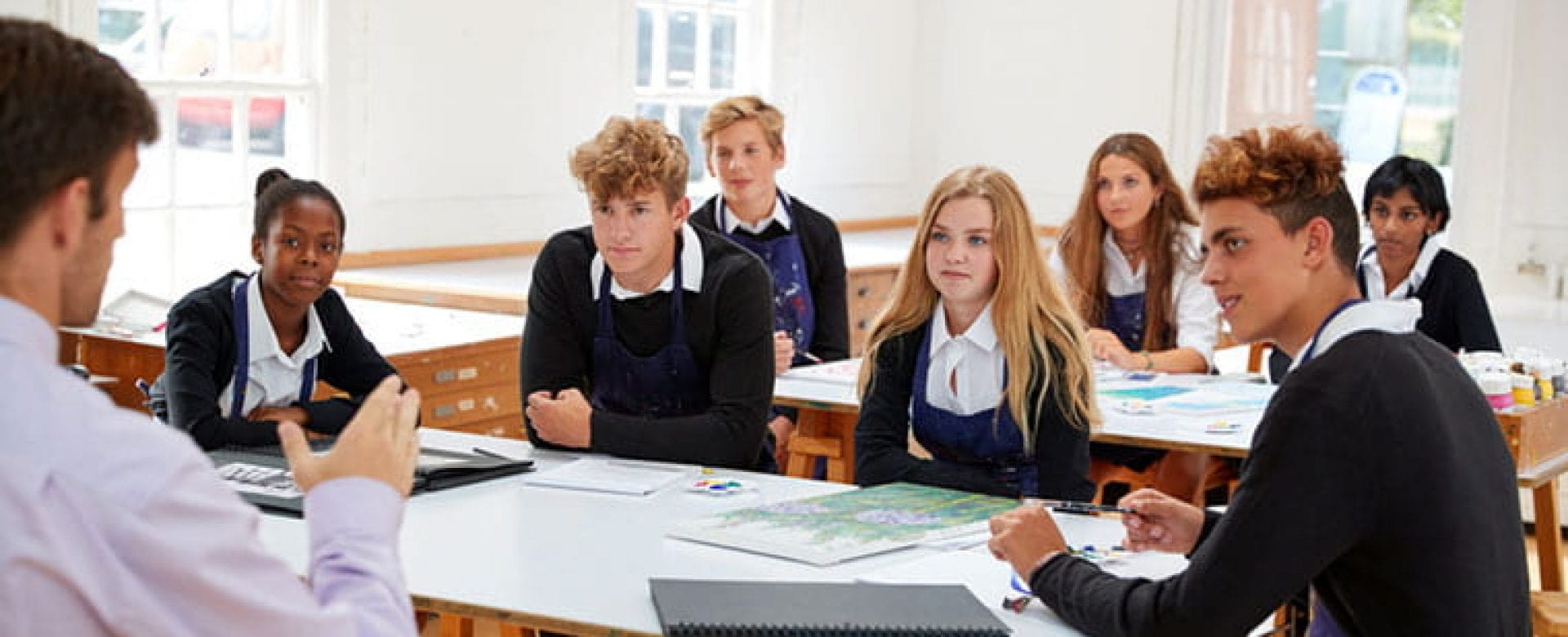Background thinking to ‘Doing Education Differently’
For a long time there has been a general acceptance by society that education, schooling and learning were synonymous concepts. However, Einstein raised a serious question about that perception, when he made the following personal observations…
‘The only thing that gets in the way of my learning is education’ and ‘Imagination is more important than education’.
More recently Sir Ken Robinson has raised further questions about whether or not we educate the creativity out of children. ‘We are educating people out of their creative capacities….. I believe this passionately, that we do not grow into creativity rather we grow out of it. Or rather, we get educated out of it.’

The more immediate crisis of the outbreak of Coronavirus and its associated condition of Covid19 has temporarily shut down the education system as we have known it for the past 150 years and has replaced it by an unregulated outburst of creative energy from teachers, children, parents and grand-parents.

This has raised further questions about what education will look like post-Covid19 and invites us to consider how education is bound to change as a result of this liberation of creativity, energy and dynamic learning…. So,
What if, following the Coronavirus emergency, we emerge with an education system which:-
- is fit for purpose for all learners with less emphasis on a ‘one-size-fits-all’ approach;
- is flexible enough to account for learners who rely on different learning patterns for managing their learning in a ‘use first’ and ‘use as needed’ way – phrases that refer to how we subconsciously (or consciously) use our preferred learning patterns to process new knowledge,
- puts leadership and learning ahead of accountability,
- that abandons high stakes assessment and focuses more on process or praxis curriculum models and less on either product or syllabus curriculum models,
- recognises limitations to a National Curriculum which unnaturally compartmentalises and restricts learning by ‘thinking in subjects’,
- looks for opportunities to develop pupils in an holistic way, rather than focusing in qualifications as a priority,
- actively encourages and empowers parental involvement in a deep, collaborative way by eradicating any suggestion of a ‘them and us’ mentality,
- provides sufficient opportunity for learners to take ownership of their learning or to follow their own interests across peer age groups and generations,
- creates and facilitates opportunities for learners of all ages to use new technologies to learn in a more flexible way,
- embraces the national trend of increasing numbers of parents home educating their children and integrates this into a more flexible attendance policy for schools,
- develops more research-based and evidence-based practice in a more systematic way that combines strategic and operational use of research-informed practice,
- rejects any form of commercial approach to education and learning or privatisation of knowledge by academy chains and reverses the trend of a loss of education as a public service as a result of the policy of setting up academies and multi-academy trusts,
- regulates the uncontrolled use of funds leading to obscene salaries for new managers and CEOs of organisations with no previous experience of running chains of schools.
Current situation: the recent outbreak of Coronavirus and Covid-19 pandemic has prompted:-
- closure of schools, colleges and universities which has led to a rise in online teaching and learning,
- enforced home education by parents,
- schools remain open for specific children (usually children of key, front-line workers),

This has resulted in:-
- an outburst of creativity and imagination from children and parents, thrown into thinking about how to use home time constructively, have fun and learn collaboratively at the same time,
- a sudden increase in the availability (or awareness) of online, distance learning materials of both an informal and formal kind,
- an immediate embrace of technology by people of all ages for communicating, collaborating and for just staying in touch, informed and entertained (or, even better for entertaining one another),
- the liberating, opening up of opportunities for anyone to learn anything that captures their interests, enthusiasms and passions, at any time, at their own pace and in their own environment, in collaboration with others if they wish,
- a willingness by teachers, college lecturers and university academics (along with any number of well-informed others) to adapt existing learning materials to make them available online and to suit distance learning,
- a need for intergenerational online contact for grandparents to remain in touch with children, grandchildren and other family members and friends.
Future thinking – a vision for the future: many systems such as Education, that were previously taken for granted, are changing rapidly in a diverse and dynamic way such that they will never be the same again.

We will be ‘Doing Education Differently’ from now on in a way that combines both formal and informal approaches to learning and education, across age groups and generations.
A probable outcome of the Coronavirus outbreak and Covid-19 pandemic is that education will evolve into a new paradigm, captured by the phrase ‘Doing Education Differently’, that encompasses three main elements:-
- Online Learning: a permanent move towards online/distance learning with open access to free materials for individuals and groups of like-minded learners of all ages.
- Home Education: an increase in the amount of time that children spend learning at home, with parents and grandparents as both home educators and co-learners.
- Flexible Schooling: a more specialised role for schools (or some kind of similar, community facility) that offers maker spaces, meeting places and provides specialist advice and guidance to deepen learning and support for gaining qualifications.
A new kind of pedagogy for a new paradigm
A key prerequisite of any new paradigm, if it is to be more than just a new ‘fashion’ is to redefine teaching and learning. No longer will it be appropriate to refer to the way that children are taught (in schools) as Pedagogy and to separate this from the way that adults learn, as Andragogy.
What will be needed is a new way of looking at learning and teaching within this new paradigm that captures the way that learners take greater ownership of their own learning as they mature, gain increased self-confidence, self-awareness and self-efficacy.
One possible way of considering this is to merge the separate concepts of learning for children and for adults into one, dynamic concept of Pedandragogy or Pandragogy, a maturity model of learning and teaching in which the learner increasingly takes greater responsibility for their own learning as they grow towards self-actualisation and self-determination. This concept will be explored further in later posts.
Whatever the new paradigm will look like, it will also need to be built on some new principles for education and learning that define purpose and form. This blog is designed to start a dialogue that considers what those key principles might be and to attempt to find a shared agreement and understanding to define them, whatever they might be.
Key principles for education of the future
The following is a not a definitive list, far from it…. this is just the beginning of a ‘big discussion’ about what education and learning might look like in the future, in terms of the principles that will underpin it and that will be clearly discernible within any new structure or framework for learning and education that emerges, post Covid-19. These initial ideas about the pedagogy and principles of future learning will be explored in later posts
Identity and awareness of self – increasingly greater awareness of identity and self as a learner (metacognition) will lead to interdependent learners who self-organise, self-direct and ultimately self-determine their learning (Heutagogy),
Evaluation and quality – in order to validate learning we will need to design quality methods of evaluation of learning and progression that include self-assessment and portfolio-building,
Age, culture, diversity and intergenerational learning – how we learn best, whether as children, adolescents or adults will matter more than what we learn, and who we learn with best, will change according to interest, context and learning preferences,
Social, emotional and mental health and well-being as a dimension of learning – arguably the most important dimension of learning because learning is suppressed when emotionally or mentally we are not in a good place and yet learning can be at its deepest when we engage with learning at a deeper emotional level,
Merging of the values of formal and informal learning – for many people, young or old, the difference between formal and informal learning is artificial and is highly arbitrary depending on how an individual learns best,
Technology as a tool for learning – potentially the most exciting and, as yet relatively unexplored, dimension.
Steve Hall-Ex Headteacher. Now Senior Lecturer in Education at the University of Staffordshire.
s.j.hall@staffs.ac.uk


In the early 1990s Istarted a company Education Resources. It’s aim was to make a computer device, which dispensed small coins from a computer. The intended use was for it to be a reward system to encourage children to get through the boring, rote parts of learning, like multiplication tables, historical dates and geographical locations. i.e. those areas of learning that do not require innovation – just hard work.
At the same time I was involved in the development of a video game suitable for use in arcades, with some of the young men that were the pioneers of a video game industry that flourished in Sheffield for a time. These were self taught innovative people and had learnt their skills without from formal training. One of them, Ben Daglish, wrote a piece for me. A link to this can be found at the end of “Jobs, training and video games (1993)” on BrusselsBlog.co.uk, http://www.brusselsblog.co.uk/jobs-training-and-video-games-1993/
An excerpt from the piece by Ben Daglish.
————————————
While in the fourth year, I formed a company with a few friends and a teacher, and we started writing educational software. After sixth form, I went off to University to study computing. I lasted a year. Not only was the standard of programming primitive compared to the standard of the software we had been writing, but I realised that I had probably written more programs in 4 years at school than any of the lecturers had in their lives – and I owned my own computer, rather than a timeshare terminal.
So I left and joined the games industry, which was chock full of people like me. The sad thing is that 15 years later, those lecturers are still there, up and down the country. Of course they have progressed, but unfortunately the IT revolution has progressed faster. One of my golden rules, and certainly one that still holds true for many IT managers, is “Never hire the graduate”. Three years away from the real world gives one a handicap that is very difficult to overcome. Not only that, but the additional handicap of ‘computing’ being adopted as part of the mainstream school curriculum means that today’s ‘creme-de-la-creme’ are leaving campus not knowing how many bits are in a byte. Just think. Who imparted the ‘necessary information’ to the school teachers about what should be in the National Curriculum Computer Studies?
——————————–
Two questions questions (for the time being):
Has there been any good research on the use of cash rewards to encourage rote learning?
Are Ben’s criticisms of teaching at universities still valid.
——————————
When I was studying for a degree in Psychology in the 1960s, much attention was being paid to different types of reward systems, including in schools, as a means of helping pupils to behave appropriately. Most attention was paid to pupils’ motivation to learn and to pupils’ behaving well. Now, as a Professor of Educational Psychology, I look back on the last fifty years of relevant research on this, and my conclusion is that the jury is still out on this one! It can work in some contexts but isn’t effective in others.
Any more detail than “It can work in some contexts but isn’t effective in others”?
Any helpful characteristics for the failures and successes?
Links?